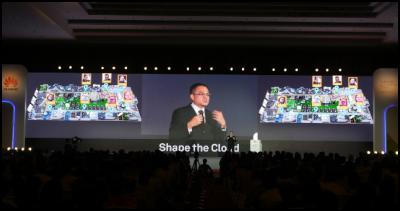
“There is no such thing as a smart city solution”, says Huawei’s Joe So.
He says: “If anyone tells you they are doing it, they are lying1”.
So should
know. While his official job title is chief technology
officer of industry solutions, enterprise business
group, So also serves as the telecom equipment
maker’s smart city specialist. He was speaking at this
week’s Huawei
Connect event in Shanghai.
Smart city still more a concept
He says there are lots of smart city components, but no single platform. He says it remains a concept more than a product.
Smart city technology is, to put it mildly, a slow burn. So says Huawei is involved in more than 100 smart city projects, yet he says it will take time before any of them deliver on the promise of being a true smart city.
He says government information is often not that smart. "All the systems government use are silos. They are not connected together.
“For a smart city to
work you need an integrated, independent system. It has to
be an open IT infrastructure and there must be great
connections — you can’t have a smart city without
connections”, says So.
Connections
So says that until recently the necessary connections were not in place. This has changed in the last three years. He says the smart city still won’t happen overnight because there is still a lot of work to be done. But the underpinning infrastructure is now in place.
In his presentation So showed slides outlining a handful of notable Huawei smart city projects. To no-one’s surprise Singapore made the cut. So did Nanjing.
The Cameroon might not top your list of likely suspects, but it was up there. As was New Zealand.
At first sight this is surprising. Despite a lot
of talk and a huge missed opportunity in Christchurch, New
Zealand doesn’t have much in the way of formal smart city
projects. And yet Huawei’s Joe So thought it merited a
mention.
UFB to underpin NZ smart city initiatives
That’s because New Zealand is building the Ultrafast Broadband network. This is the communications infrastructure needed to make smart city projects viable.
It makes perfect sense from Huawei’s point of view to highlight UFB. Huawei may be moving fast into information technology but its core business is making telecommunications equipment. It supplies switches and other technology used to build the UFB network.
It also supplies
technology for mobile phone carriers. Wireless is another
way to build the connections needed for a smart
city.
Device, pipe, cloud
One of the themes hammered home again and again at Huawei Connect is that the company focuses on device, pipe and cloud. All three play an important role in any smart city project.
New Zealand’s UFB fibre network is being rolled out to the 75 percent of the population who live in towns. That’s almost the definition of a nationwide smart city-ready network.
Supplying the networks needed to build smart cities is a lucrative business. Building and marshalling pipes is what made Huawei big in the first place. It delivers the margins needed to invest in other markets such as smart city applications.
What remains to be seen is how far Huawei can move up the smart city food chain. The company talks of using open technologies and of forming partnerships with other specialists. These would be essential. Yet, as So says, it seems the true smart city is still a concept.
- Here Joe So is referring to an all-embracing smart city solution, there are products aimed at solving part of the smart city puzzle. Huawei launched its Safe City Integrated Communication Platform during Huawei Connect.
Slow path to smart cities: Huawei Connect was first posted at billbennett.co.nz.
Bill Bennett travelled to Shanghai as Huawei’s guest.



 Richard S. Ehrlich: China's Great Wall & Egypt's Pyramids
Richard S. Ehrlich: China's Great Wall & Egypt's Pyramids Gordon Campbell: On Surviving Trump’s Trip To La La Land
Gordon Campbell: On Surviving Trump’s Trip To La La Land Ramzy Baroud: Famine In Gaza - Will We Continue To Watch As Gaza Starves To Death?
Ramzy Baroud: Famine In Gaza - Will We Continue To Watch As Gaza Starves To Death? Peter Dunne: Dunne's Weekly - A Government Backbencher's Lot Not Always A Happy One
Peter Dunne: Dunne's Weekly - A Government Backbencher's Lot Not Always A Happy One Richard S. Ehrlich: Cyber-Spying 'From Lhasa To London' & Tibet Flexing
Richard S. Ehrlich: Cyber-Spying 'From Lhasa To London' & Tibet Flexing Gordon Campbell: On Aussie Election Aftershocks And Life Lessons
Gordon Campbell: On Aussie Election Aftershocks And Life Lessons